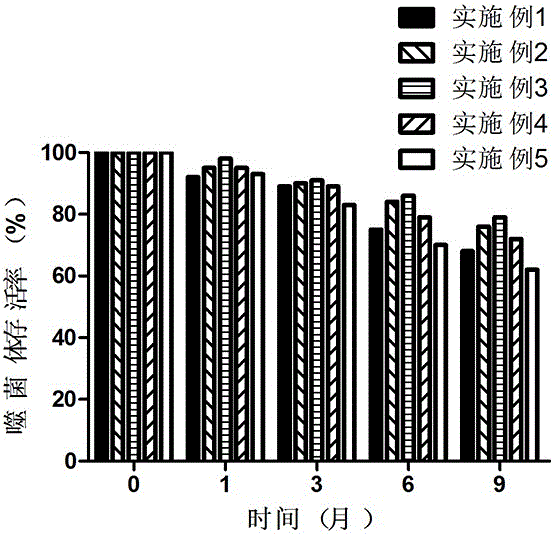Preservation method for bacteriophage
A preservation method and phage technology, which is applied in the field of biotechnology and microbial products, can solve the problems of restricting the application and development of phage, the short storage time of phage, and the poor preservation effect of phage, and achieve low storage environment requirements, good adaptability and convenient application Effect
- Summary
- Abstract
- Description
- Claims
- Application Information
AI Technical Summary
Problems solved by technology
Method used
Image
Examples
Embodiment 1
[0024] A preservation method of coliphage, completed under 4% humidity conditions, comprising the following steps:
[0025] 1) The E. coli phage solution was left standing at 2°C for 4 hours, flocculent precipitates appeared, and centrifuged at 8000r / min for 20min;
[0026] 2) Add phage buffer solution to the above-mentioned precipitate, dissolve the precipitate, and obtain phage liquid; the phage buffer solution includes the following components in terms of weight components: 8 parts of Tris hydrochloride, sodium chloride 0.05 parts, 1 part of potassium chloride, 5 parts of magnesium sulfate, 1 part of dipotassium hydrogen phosphate, 8 parts of sodium dihydrogen phosphate, 0.05 parts of gelatin and 100 parts of deionized water, and use dilute hydrochloric acid and / or sodium hydroxide to adjust the pH to 7;
[0027] 3) The phage preservation and protection agent equal to the volume of the phage liquid is mixed evenly to obtain the phage stock solution. The amino acids of the ...
Embodiment 2
[0031] A method for preserving Mycobacterium phage, which is completed under 6% humidity conditions, comprising the following steps:
[0032] 1) The Mycobacterium phage solution was left standing at 7°C for 8 hours, flocculent precipitates appeared, and centrifuged at 12000r / min for 40min;
[0033] 2) Add phage buffer solution to the above-mentioned precipitate, dissolve the precipitate, and obtain phage liquid; the phage buffer solution includes the following components in terms of weight components: 15 parts of Tris hydrochloride, sodium chloride 0.2 parts, potassium chloride 5 parts, magnesium sulfate 20 parts, dipotassium hydrogen phosphate 3 parts, sodium dihydrogen phosphate 12 parts, gelatin 0.1 part and purified water 100 parts, and use dilute hydrochloric acid and / or sodium hydroxide to adjust the pH to 7.5.
[0034] 3) A phage preservation and protection agent 2.5 times the volume of the phage liquid was mixed evenly to obtain a phage stock solution. The amino acids...
Embodiment 3
[0038] A method for preserving vibrio alginolyticus phage, which is completed under 5% humidity conditions, comprising the following steps:
[0039] 1) The Vibrio alginolyticus phage solution was left standing at 5°C for 6 hours, flocculent precipitates appeared, and centrifuged at 10,000 r / min for 30 minutes;
[0040] 2) Add phage buffer solution to the above-mentioned precipitate, dissolve the precipitate, and obtain phage liquid; the phage buffer solution includes the following components in terms of weight components: 12 parts of Tris hydrochloride, sodium chloride 0.1 parts, 3 parts of potassium chloride, 10 parts of magnesium sulfate, 2 parts of dipotassium hydrogen phosphate, 10 parts of sodium dihydrogen phosphate, 0.08 parts of gelatin and 100 parts of deionized water, and use dilute hydrochloric acid and / or sodium hydroxide to adjust the pH to 7.2;
[0041] 3) A phage preservation and protection agent with 2.2 times the volume of the phage liquid was mixed evenly to...
PUM
 Login to View More
Login to View More Abstract
Description
Claims
Application Information
 Login to View More
Login to View More - R&D
- Intellectual Property
- Life Sciences
- Materials
- Tech Scout
- Unparalleled Data Quality
- Higher Quality Content
- 60% Fewer Hallucinations
Browse by: Latest US Patents, China's latest patents, Technical Efficacy Thesaurus, Application Domain, Technology Topic, Popular Technical Reports.
© 2025 PatSnap. All rights reserved.Legal|Privacy policy|Modern Slavery Act Transparency Statement|Sitemap|About US| Contact US: help@patsnap.com



